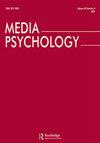性格个性化与性格形成的实验探索
IF 2.6
2区 心理学
Q1 COMMUNICATION
引用次数: 3
摘要
摘要个体化是人类根据自身的各种独特特征形成对他人感知的过程。心理学研究发现,个人细节会使一个人个性化,尤其是当他们被认为是社会类别的非典型时。我们将这一逻辑应用于情感倾向理论,以确定性格个性化是否会影响倾向的形成。两项试点研究验证了六对性格细节的典型性和道德无关性。然后,我们在一个实验(N=822)中部署了这些细节,参与者观看了一个虚构的美国海军陆战队人物的传记。我们以连续的方式操纵传记中非典型人物细节的比例。研究结果表明,操纵和几个角色感知变量之间存在正线性关系。将判别有效性添加到研究结果中,我们发现操纵和感知现实主义之间存在负相关。我们的实验设计和分析控制了角色与参与者的客观相似性以及角色细节的道德相关性。因此,我们的研究结果表明,性格个性化是一种独特的、以前尚未确定的性格形成途径。本文章由计算机程序翻译,如有差异,请以英文原文为准。
Character Individuation and Disposition Formation: An Experimental Exploration
ABSTRACT Individuation is the process by which humans form their perceptions about others based on a variety of unique attributes of the person. Psychological research finds that personal details can individuate a person, especially when they are perceived as atypical for the social category. We apply this logic to affective disposition theory to determine whether character individuation can influence disposition formation. Two pilot studies validated the typicality and moral irrelevance of six pairs of character details. We then deployed these details in an experiment (N = 822) in which participants viewed a biography of a fictional U.S. Marine character. We manipulated the proportion of atypical character details included in the biography in a continuous fashion. Findings indicate a positive linear relationship between the manipulation and several character perception variables. Adding discriminant validity to the findings, we found a negative relationship between the manipulation and perceived realism. Our experimental design and analyses controlled for objective similarity of the character with the participant and the moral relevance of the character details. Thus, our results suggest character individuation is a unique and previously unidentified route of disposition formation.
求助全文
通过发布文献求助,成功后即可免费获取论文全文。
去求助
来源期刊

Media Psychology
Multiple-
CiteScore
8.60
自引率
7.10%
发文量
30
期刊介绍:
Media Psychology is an interdisciplinary journal devoted to publishing theoretically-oriented empirical research that is at the intersection of psychology and media communication. These topics include media uses, processes, and effects. Such research is already well represented in mainstream journals in psychology and communication, but its publication is dispersed across many sources. Therefore, scholars working on common issues and problems in various disciplines often cannot fully utilize the contributions of kindred spirits in cognate disciplines.
 求助内容:
求助内容: 应助结果提醒方式:
应助结果提醒方式:


